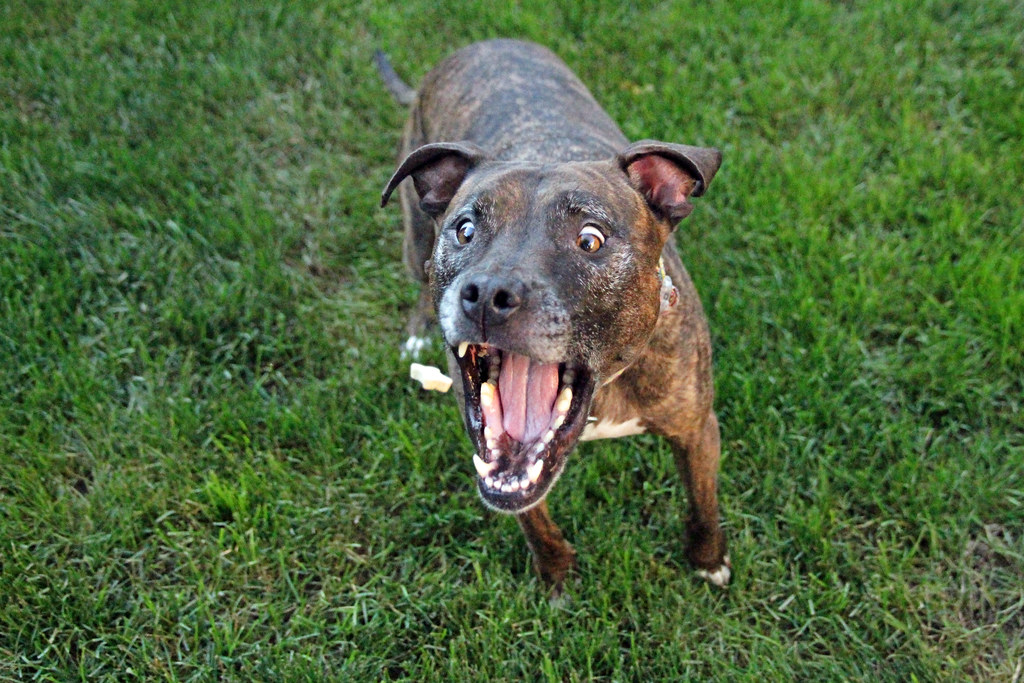(This posting is only for dogs who have mast cell disorders, as we must be diligent to keep their histamine levels down, and probiotics can play a role in this.)
Since late Spring, Molly has suffered three episodes of completely unexplained intractable vomiting. Two such episodes resolved in 24 hours, one landed us in the doggie ER. You blame yourself as a dog owner, scouring your mind for what you let your dog eat that could have caused this digestive upset. I feel very strongly that Molly's histamine disorder causes these vomiting attacks. The histamine overload increases stomach acid production. (This is the reason we give Pepcid regularly to mast cell dogs.)
Probiotic! There is that word. I wanted to get Molly on a probiotic supplement, and one that was not loaded with fillers. There are a lot of probiotic "treats" for pets that are heavily processed and full of filler ingredients, with little to no actual probiotics. It is very important to read the ingredient lists. At some point in my research I stumbled across this article Is your Probiotic making you Sick?
This link is an excellent read and it contains some extremely important information for mast cell dogs who go on probiotics: Some strains or probiotics can actually raise histamine levels. And some strains lower histamine levels. This is crucial. You can be really really helping your mast cell dog with probiotics, or you could be doing exactly the opposite. Do you feed probiotics to your mast cell dog? Great! But read the ingredient label and make sure that the strains contained within are lowering her histamine levels.
Histamine Raising: lactobacillus bulgaricus, lactobacillus casei*, s. thermophilus, lactobacillus delbrueckii, lactobacillus helveticus
*I see lactobacillus casei in a lot of pet products!
Histamine Lowering: bifidobacterium infantis, lactobacillus gasseri, lactobacillus rhamnosus*, bifidobacterium longum, lactobacillus plantarum, bifidobacterium breve, lactobacillus salivarius, b. bifidum
*This article states that this strain of probiotic "stabilizes mast cells". Yes please!
"Controversial": From what I am seeing, these strains are under some debate regarding being neutral or histamine raising. I am inclined to avoid them altogether for this reason.
lactobacillus acidophilus, lactobacillus lactis, lactococcus lactis, lactobacillus reuteri raises histamine but also increases the levels of anti inflammatory cyclic adenosine monophosphate (cAMP). That is quite scientific sounding and to be honest I am choosing to avoid any products that contain this strain.
Moving forward, all there is to do is pick a product out of the enormous amount available! (Ugh.) Read the ingredient list carefully. It is shocking how many pet probiotic products are glorified treats, with little to no actual probiotic strains included. If you feed a commercial food or kibble, it is wise to check the ingredient list there as well. Some kibble, such as the Taste of the Wild line, actually contain probiotics in their formulas. Be sure that whatever strains are in your pet's kibbles are histamine lowering.
I saw Kyodophilus-9 recommended multiple times. This is a product intended for human use, but contains no ingredients harmful to dogs. It has great reviews and contains all histamine lowering probiotic strains, including lactobacillus rhamnosus. At this time I will be ordering and using this probiotic product for Molly with high hopes that adding a histamine lowering probiotic to her diet will prevent any further vomiting attacks. The instructions are half a capsule twice per day for a child, or a full capsule twice a day for adults. I will be starting with the half capsule dose since Molly weighs less than half of what most adult humans weigh.


Thank you for this information! I too have a dog with MCT and want to give him the very best probiotic for him. I will look into the one you found to have the beneficial strains.
ReplyDeleteYou're welcome and all the best to you and your dog! Molly has been 4+ months without GI attacks on this probiotic so I am very hopeful.
ReplyDeleteHow much does Molly weigh and what dosage do you give her?
ReplyDelete